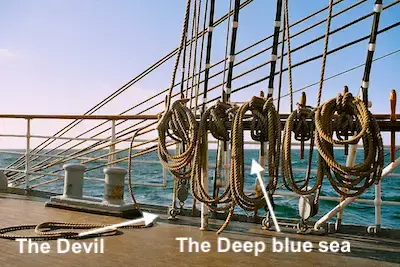In difficulty, faced with two dangerous alternatives.
Between the Devil and the deep blue sea
What's the meaning of the phrase 'Between the Devil and the deep blue sea'?
What's the origin of the phrase 'Between the Devil and the deep blue sea'? – The short answer:
No one knows for sure how this expression originated. It is widely believed that the phrase is of nautical origin and that the ‘devil’ refers to the seam on a ship’s hull. The evidence for that is lacking and it is more likely that the ‘devil’ is a reference to Satan.
What's the origin of the phrase 'Between the Devil and the deep blue sea'? – The full answer:
The phrase was originally ‘Between the Devil and the deep sea’ (and sometimes ‘the Dead Sea’ or ‘the Red Sea’). The sea turned blue much later and the phrase became well-known via the title of a popular song Between the Devil and the Deep Blue Sea, written by Ted Koehler and Harold Arlen, and recorded by Cab Calloway in 1931.
What’s the source of the original phrase? Well, we would really like to know. CANOE, the mythical Committee to Ascribe a Nautical Origin to Everything, would have us believe that it has a nautical origin (well, they would wouldn’t they?). In her book ‘When a loose cannon flogs a dead horse there’s the devil to pay’ Olivia Isil attributes a nautical origin to the phrase, albeit without providing any evidence.
Set against that there’s the explanation that this is from the usual meaning of Devil, that is, the supreme spirit of evil. If it’s that Devil we are talking about then the origin is straightforward – the Devil is bad and falling in the deep sea is bad, so when being caught between the two would be cause for concern.
People who like that explanation can point back to Greek mythology for an earlier version of the idea of being caught between evil and the sea. Homer’s Odyssey refers to Odysseus being caught between Scylla (a six-headed monster) and Charybdis (a whirlpool).
To explain the nautical theory we’ll need to define some sailing terminology. That’s always dangerous ground for landlubbers and usually results in some horny-handed sailing type writing in to say that I don’t know my scuppers from my square knots, but here goes anyway…
“Devil – the seam which margins the waterways on a ship’s hull”.
This definition is from Admiral Henry Smyth’s important The Sailor’s Word-Book: an alphabetical digest of nautical terms, 1867. That definition wasn’t entirely clear to me, but a correspondent who describes himself as ‘an engineer and vessel constructor’ clarified it this way:
“Devil – the seam between the deck planking and the topmost plank of the ship’s side”.
To be ‘between the devil and the deep sea’ a sailor would need to be at the very edge of the deck, or even over the side, either way a very precarious position.
Incidentally, another term for filling a seam is ‘paying’. Those that like nautical origins also give this as the source for the Devil to pay, although the evidence is against them on that one.
The first recorded citation of ‘the Devil and the deep sea’ in print is in Robert Monro’s His expedition with the worthy Scots regiment called Mac-keyes, 1637:
“I, with my partie, did lie on our poste, as betwixt the devill and the deep sea.”
The seafaring theory is plausible, but does it hold water? Was the nautical term ‘devil’ in use when the phrase was coined? We’ve no evidence to show the word in that context until over two hundred years after the first sighting of the phrase. If the phrase really does pre-date the word then the nautical derivation is clearly incorrect. The onus falls on the nautical believers to provide the evidence – and I’m not holding my breath on that.
CANOE doesn’t quite convince with this one. On balance it seems wise to stay on dry land and stick with the Devil we know.
See also ‘Between a rock and a hard place‘.
See other Nautical Phrases.
Related phrases and meanings
Browse more Phrases
About the Author

Phrases & Meanings
A-Z
A B C D E F G H I J K L M N O P Q R S T UV W XYZ
Categories
American Animals Australian Bible Body Colour Conflict Death Devil Dogs Emotions Euphemism Family Fashion Food French Horses ‘Jack’ Luck Money Military Music Names Nature Nautical Numbers Politics Religion Shakespeare Stupidity Entertainment Weather Women Work
How did we do?
Have you spotted something that needs updated on this page? We review all feedback we receive to ensure that we provide the most accurate and up to date information on phrases.
